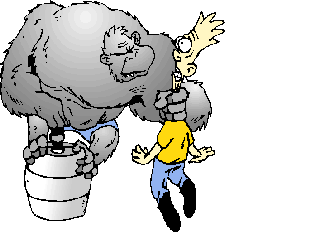
Tell Me What I Say
By Wayne Maruna
There are certain phrases in our culture that are so overused they almost make me crazy.
There was an annual event on my former employer’s calendar. All the execs and upper level managers would gather in a beautiful tiered auditorium to listen to reviews of the prior year’s performance and plans for the coming year. I knew what that meant. That meant that before long, a certain VP would take the stage and, over the course of the next thirty minutes, proceed to use the phrase ‘at the end of the day’ about fifty seven times. To the casual observer, I would appear to listening attentively, when in fact I was plotting murder. In my imagination, after the 25th ATEOTD, I would walk to the podium and throttle him with my bare hands. “That, my friend, is the permanent end of your day,” I would say through clenched teeth.

In my retirement I have developed the habit of working the L.A. Times crossword puzzle each day on my iPad in the hope that it will stave off any genetic tendencies toward dementia. One thing I have learned doing these puzzles is that we are a country of shared idioms and colloquialisms. Phrases I thought were unique to me and my kin are apparently uttered by farmers in Nebraska and fishermen in Alaska.
As a society we have developed shorthand ways of saying things, like ‘at the end of the day’ instead of perhaps ‘in the final analysis or ‘when all is said and done’. The phrase has no relationship to something being completed in a 24 hour time frame.
Another phrase that has been used ad nauseam is ‘between a rock and a hard place’. As far as I am concerned, the next person to utter that phrase should just explode on the spot, spontaneous human combustion for the betterment of mankind. Why not just say ‘I have no good choice here’, but no, the speaker is ‘between a rock and a hard place’.
![]() Kablam!
Kablam!
![]()

I read an interview today with a second string football player who said he was ‘champing at the bit’ to get some playing time. I did not see a video of the interview, but I’d think it a pretty safe bet to say he was not wearing a horse bridle when he said that. Sir, next time just tell us you’re really eager to play; and save the equine references for the sports writers who have seen your less than stellar play.
Such phrases are called idioms. According to a definition I found on the web, an idiom is “a group of words established by usage as having a meaning not deducible from those of the individual words, and that holds a certain meaning with only a specific group of people” (common culture). So when a business exec tells his minions to go after the ‘low hanging fruit’, they do not set off into the orchard. They know he or she means to go and find the easily resolved opportunities for improvement.
I suppose idioms serve a purpose in conveying meaning in a colorful shorthand manner. The problem is that they get overused…way overused. If you sit through enough business meetings, you really come to despise anyone who mentions low hanging fruit.
Actually, idioms may not always serve as linguistic shortcuts. What’s faster and more direct to say: ‘it’s raining very hard’, or ‘it’s raining cats and dogs’? Who came up with that one? When you think about it, raining cats and dogs is actually kind of stupid. Yeah, yeah, poodles for puddles, I get that. Ha ha.
The website englishlanguageterminology.org has a good long list of common idioms including:
Beat a dead horse
Caught with your pants down
Don’t look a gift horse in the mouth
Elbow Grease
Hit the hay
Hold your horses (what’s with all these horse references?)
Kick the bucket
Let sleeping dogs lie
Rub someone the wrong way
Tie the knot
Under the weather
Try telling someone in an ‘English as A Second Language’ course that they are beating a dead horse. They may look down in the dumps, maybe even want to throw in the towel, even though you know hands down that you are just pulling their leg. After all, idioms are a piece of cake even if they’re all Greek to someone just coming from another culture. But don’t let such phrases drive you up a wall. Keep your chin up, because we’re all in the same boat. Take heart, for at the end of the day, there’s a light at the end of the tunnel.